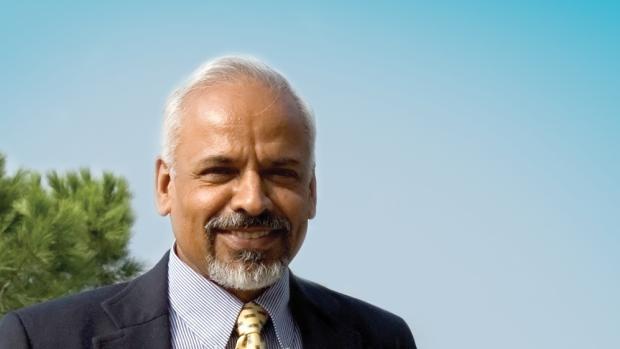Catching up with Dean Emeritus Katepalli Sreenivasan

Katepalli Sreenivasan, Dean Emeritus of NYU Tandon School of Engineering
Update: Sreenivasan’s 2020 laurels just keep accruing. In late July, he garnered the American Physical Society’s annual Fluid Dynamics Prize for his “fundamental contributions to fluid dynamics, especially turbulence from quantum to astrophysical scales,” and Science Advances featured his co-authored article about turbulence in the sun on its cover. Among his many other recent publications causing buzz in the scientific world is an important piece in the Proceedings of the National Academy of Sciences (PNAS) on the heat transport law in turbulent convection.
Originally published 5/18/2020
Back when Katepalli Sreenivasan served as dean of the school, from 2013 to 2018, it was difficult for anyone trying to create a short biographical profile to comprehensively convey the extent of his accomplishments. It was certainly necessary to mention that he was one of the rare few to hold the NYU distinction of being named a University Professor, a title conferred upon scholars whose work is interdisciplinary and reflects exceptional breadth. Then, there were the academies to which he had been elected, among them the U.S. National Academy of Sciences, the U.S. National Academy of Engineering, the American Academy of Arts and Sciences, the Accademia dei Lincei, the Indian Academy of Sciences, the Indian National Science Academy, the Academy of Sciences for the Developing World (TWAS), the African Academy of Sciences, etc. And that was even before beginning to compile the international laurels he had garnered: the Guggenheim Fellowship, the UNESCO Medal for Promoting International Scientific Cooperation and World Peace from the World Heritage Centre, the Distinguished Alumnus Award and Centennial Professorship of the Indian Institute of Science, the Dwight Nicholson Medal of the American Physical Society for human outreach, Award for International Scientific Cooperation from the American Association for the Advancement of Science, the Multicultural Leadership Award of the National Diversity Council, and others far too numerous to list.
That task has now gotten exponentially harder. We recently caught up with Sreeni, as he is fondly known, to discover what he’s been up to since leaving the Dean’s office and were pleased (but unsurprised) to learn that several new academic honors have come his way.
In 2018, shortly after stepping down as Dean, Sreeni — who remains the Eugene Kleiner Professor for Innovation in Mechanical Engineering, as well as Professor of Physics at the NYU College of Arts and Science and Professor of Mathematics at Courant — was named an external scientific member of the Max Planck Institute for Solar System Research, in Göttingen, and a Scientific Member of the Max-Planck Society.
From 2018 to 2019, he served as a visiting professor at the Institute of Advanced Study in Princeton, and he was subsequently named Simpson Distinguished Visiting Professor in the Department of Mechanical Engineering at Northwestern University. In 2020 he was named an Honorary Fellow at the Tata Institute of Fundamental Research, in Mumbai, a distinction shared by only 19 others from around the world, several of whom are Nobel laureates and Fields medalists.
His other recent honors include the Charles Russ Richards Memorial Award for “outstanding achievements in mechanical engineering for twenty years of more following graduation”, given jointly by the American Society of Mechanical Engineers (ASME) and Pi Tau Sigma Honor Society; the Society of Engineering Science (SES) G.I. Taylor Medal — given for “outstanding research contributions in either theoretical or experimental Fluid Mechanics or both” and scheduled to be awarded at the group’s 57th Annual Technical Meeting in September 2020; and the von Karman Medal of the American Society of Civil Engineers for “lasting scientific contributions to diverse fluid dynamical topics from cryogenics to solar convection, especially the dynamics and mixing of turbulence in laboratory, computational and terrestrial flows, and vast impact on scholarship, scientific development and education in many countries.”
Asked for a possible reason for this flurry of honors, Sreeni was characteristically humble and stated that while he couldn’t be certain, he assumes that much of it has been triggered by his return to full-time research. While he had never fully stopped conducting research — even as administrative roles took up much of his time — he has been presenting his work more frequently since his 2018 departure from the Dean’s office. He and his co-authors have published some two-dozen papers in the last two years, for example, with a dozen more at various pre-publication stages.
Sreeni says that he had originally come to the U.S. to concentrate on his research work, and while he misses interacting as closely as he once did with his administrative colleagues, he absolutely relishes the chance to focus on long-standing research problems that have been on his mind and explore new avenues more deeply. He still, however, has certain administrative duties: he was recently elected Chairman of his Section of the National Academy of Sciences, and he serves on the American Physical Society's Committee on the International Freedom of Scientists, an area that interests him greatly.




